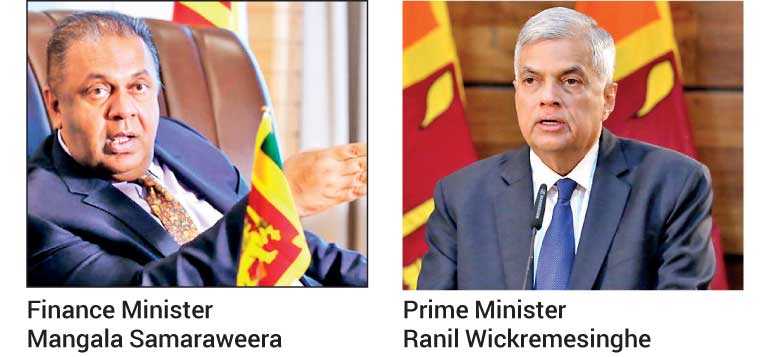Thursday Feb 26, 2026
Thursday Feb 26, 2026
Wednesday, 30 October 2019 02:09 - - {{hitsCtrl.values.hits}}

By Chandani Kirinde
In a major breakthrough, the Cabinet of Ministers yesterday approved the implementation of the $ 480 million Millennium Challenge Corporation (MCC) grant, based on a proposal by Finance Minister Mangala Samaraweera.
While authorising Minister Samaraweera to sign the Compact Agreement with the MCC on behalf of the Sri Lankan Government, Cabinet also approved tax exemptions for related projects, as well as the enactment of a new Act to give legal effect to the signed agreements. “This is a great victory for the Government and augurs well for the future,” the Finance Ministry said in a statement.
The US Embassy said it welcomed the Cabinet decision. It added that the MCC grant included investments to reduce traffic congestion in Colombo, modernise the bus service, and upgrade inter-provincial roads in the centre of the country. It also includes support for Government initiatives to improve land administration.
“Sri Lanka will retain oversight and control of all aspects of the proposed projects,” the US Embassy added.
Cabinet approval for the implementation of the MCC grant came after months of haggling between the Cabinet and President Maithripala Sirisena, who had earlier expressed reservations over the program. However, after clarification by the Finance Minister, who brought the proposal to Cabinet, it was given the go-ahead yesterday.
According to the Cabinet Memorandum relating to the Compact Agreement, the Legal Draftsman will be directed to draft the MCC Sri Lanka Act, which will include the signed agreements as part of its schedules. The agreement is also to be placed before Parliament after it is signed.
Minister Samaraweera in his Memorandum informed Cabinet of the urgency to sign the Compact Agreement, stating that as Sri Lanka had now been classified as an upper middle-income country by the World Bank, it would become ineligible for MCC grant assistance as per the MCC’s eligibility criteria, when the next criteria review relating to the MCC takes place in approximately two months.
“This makes it imperative that the Sri Lankan Government sign the Compact Agreement before the upcoming review, so that the Government succeeds in securing grant assistance for the benefit of the people of Sri Lanka,” Cabinet was told.
The Minister sought Cabinet approval to amend the Inland Revenue Act to exempt funding from certain income tax and personal income tax, identify the Compact (MCC Agreement) and the activities under the Compact as a Specified Project under the Value Added Tax Act.
Other tax concessions will include deferring payments on VAT, NBT, Customs import duty, cess, Excise (Special Provisions) Duty and Ports and Airport Development Levy on the temporary admission of equipment, vehicles and household goods other than consumable goods.
The Minister informed Cabinet that considerable time, money, resources, and effort had been spent to prepare the Compact Program, and this had been carried out diligently to amend matters of concern pertaining to the Compact, to be dealt with in a transparent manner after it was signed and placed before Parliament.
If there is a component of the identified projects that the Government does not wish to carry out for some reason, it has the option of omitting these elements.
While the agreement can be signed early, as confirmed yesterday at the Cabinet meeting, the implementation will begin in early 2020, the Finance Ministry said in its statement.
It added that Compact programs to be funded by this project had been developed by Sri Lankan officials of line Ministries and Departments, based on the needs of the country. The Government has the option of amending the identified projects even after the signing of the agreement, the Finance Ministry said.
Over 30 countries are recipients of such grant funds from the US. Sri Lanka is the 37th recipient of such a grant.
Sri Lanka began negotiations with the MCC in 2001 on the instructions of then-Prime Minister Ranil Wickremesinghe. The MCC negotiations were led by the Ministry of Finance and the MCC Compact was developed and finalised by the Compact Development Team of the Prime Minister’s office.